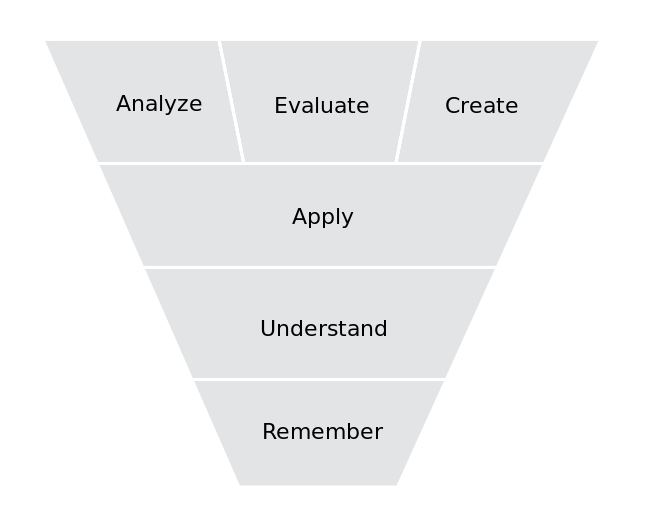Is it the role of a teacher to impart information or to empower students with the skills needed to find information on their own?
When a teacher professes a political position in a classroom, student learning suffers a short-circuit. Teachers have strong rights of expression, although courts will uphold teacher dismissal for indoctrination (see this pdf from Pearson: Teacher Freedom of Expression).
From my view, indoctrination isn’t the only problem, it’s the teaching itself that has gone wrong. With properly aligned teaching that aims to develop both core knowledge and independent student thought, there will be no indoctrination.
Education theory: content or skills?
Pedagogy can get all twisted around the seemingly opposite goals of developing student content knowledge or thinking skills. In their extremes, the one is pure fact-based learning and the other is all process without destination.
Alone, they’re both wrong. To learn something new, students must have existing prior knowledge to apply to the new knowledge they seek through application of their skills. But I can’t possibly arm students with the skills necessary to understand the Roman Cursus Honorum without first engaging them in basic knowledge about the origins and purposes of Roman social structures.
They have to know something first. I call it “context” and “prior knowledge” — students need an anchor for their skills in content.
So, yes, skills such as researching are essential, but when disconnected from content knowledge it’s fishing without a line.
All Skills & No Knowledge
When I became a high school History department Chair, the first thing I did was to reach out to college History Chairs to ask what they’d like to see from their incoming college freshmen. Some talked about raising historical literacy, others reading and writing skills. But all of them said that they’d just like their incoming freshmen to know more historical facts.
One major university Chair I spoke with was adamant about it:
Not to know the themes and events is disappointing. You really can’t teach them events before they know dates and other events. But worse, students need to have a better idea of history, not just a date but knowledge of important events and how they occurred.
These college professors aren’t worried about student content knowledge unto itself, they’re worried that they can’t teach higher level history to students who lack historical background knowledge.
As my own high school history teacher, the late, great, Mr. Walsh said to us every time we showed up to class without doing the readings,
I can’t teach it to you if you don’t already know it!
Back then we thought it was ridiculous. Of course he was right, and makes my point perfectly: learning is a combination of skills and knowledge as the one must build upon the other.
All Knowledge, No Skills = Knowing Nothing
On the other hand, knowing something is not necessarily thought, so learning must always extend past content knowledge to processing knowledge.
We all know how boring History, or any other subject, can be when it’s all about the facts. So the thoughtful History teacher will attempt to engage kids in the process of learning history, learning how to learn, i.e. skills-based learning.
When I work with AP History students, the first thing I do is quiz their historical knowledge: what event, what date, what next?
A student can ace an AP History test through brute memorization, but for the rest success is of a combination of baseline knowledge empowered by thinking skills. It’s the contextualizing, connecting, extending and applying that leads to success, not just the core content knowledge, which alone is an island — and according to my own classroom grading scale, based on Bloom’s Taxonomy, is a D, not an A.
Bloom’s expresses what we want our students to achieve beautifully:

But here’s the catch: you can’t reach the top without first climbing up from the bottom. You gotta know stuff first!
My own teaching strategy was to emphasize the facts but without required memorization. Every student in every class had a History handbook with glossaries, charts, timelines, and vocabulary that we referred to daily. I needed them to know what I was talking about at any given time, so by scaffolding the content, I could help them process both the pure historical knowledge and the intellectual skills required to understand it.
So there’s no skipping the content, as skills don’t exist without their application to something concrete.
Here’s the rub: who defines that content and how?
When teachers own the truth, danger lurks.
My first job teaching, I learned that persuasion is the more effective means to engaging students than force. But it is vastly difficult for a teacher to both design a method and then actually let go and allow kids to choose for themselves. This is the art of teaching that no one can ever fully master, and when I left teaching after nearly a decade of classroom work, I was still trying to figure it out.
But I did learn that regardless of methods or purpose, teachers have enormous power over student minds — and some don’t use it carefully.
Of course, curricular decisions are bound to teacher perspective. As a History teacher, I value certain periods and concepts that other teachers may not care about. Can’t avoid that. But as a professional, my job is to identify the content and skills outcomes required of a course and then develop the most effective path to it for my students.
It gets dangerous, though, when those course objectives or the path toward them are politicized.
Content + Teacher Opinion = Propagandizing not Teaching
Entering the high school classroom, I was entirely unprepared for the political climate of our secondary schools teaching staffs. I never noticed it as a kid — but that’s the point, because kids don’t notice it.
But they do absorb it.
During my first month of teaching at a public high school, I shared a classroom with another Government teacher who would start his lessons as I packed up to leave. It was good for me to see how another teacher managed a class, but his enduring example for me was how NOT to teach:
He came one day, plopped his materials on the desk, and addressed the class,
Today we’re going to study that most unfortunate of amendments, the Second.
I’ll never forget it. I don’t care what you feel about the Second Amendment, but to frame a lesson from the teacher’s desired political conclusion was to me educational malpractice.
As I was teaching the same unit, my students were already in the process of engaging that difficult, controversial topic. Their job was to 1) understand it along with the rest of the Constitution; 2) understand it as a current political issue; and 3) develop their own conclusions. My job was to guide their path, not their destination.
This other teacher’s students were robbed of that process, as their teacher told them ahead of time what to conclude. His students were deprived of an intellectual journey and learned only that what the teacher says is what counts and not what they may discover for themselves.
Unlike students in that other class, a few of mine argued the “orginalist” position on the Second Amendment, while most others took that other teacher’s position – ideas developed on their own not at my insistence. Best of all, all of my students were able to argue knowledgeably both for and against those points of view, a teaching victory regardless of my own views, which I hold strongly but did not and have never shared with my students.
The Politicized Classroom is Not Teaching
It’s not new to the moment, but with the recent national election, I am regularly seeing news articles about classrooms across the country in which the teacher preaches a political view rather than engaging students in the necessary content knowledge and thinking skills to develop, question, and argue their own political opinions.
Whatever the political side, it’s hateful. Whether the educator wants students to learn content or skills or both, we must all take offense at the pre-judgement embed in a politicized classroom that disallows not just alternative views but thought. I can’t think of a worse thing to do to a child than to demand what to think. We’re here to teach, not preach.
I consider it a singular success of my teaching career that my students never knew my political beliefs. If they questioned it, my only response was, “Well, what do you think?” Had I told them directly there’d be no thought, no learning over the consideration, and, worse, confirmation bias would take over their learning.
Sometimes when they insisted, I’d let them take a class poll, and the kids would invariably assign all kinds of political beliefs to me. When I asked them about their other teachers, they were almost always unanimous and accurate in their assignment of teacher political slant.
Asking why, they would frequently point to the posters that teacher had put up on the classroom walls. Yep, teachers, even those Che Guevara or anti-abortion posters you hung on the wall are preaching, not teaching.
– Michael
